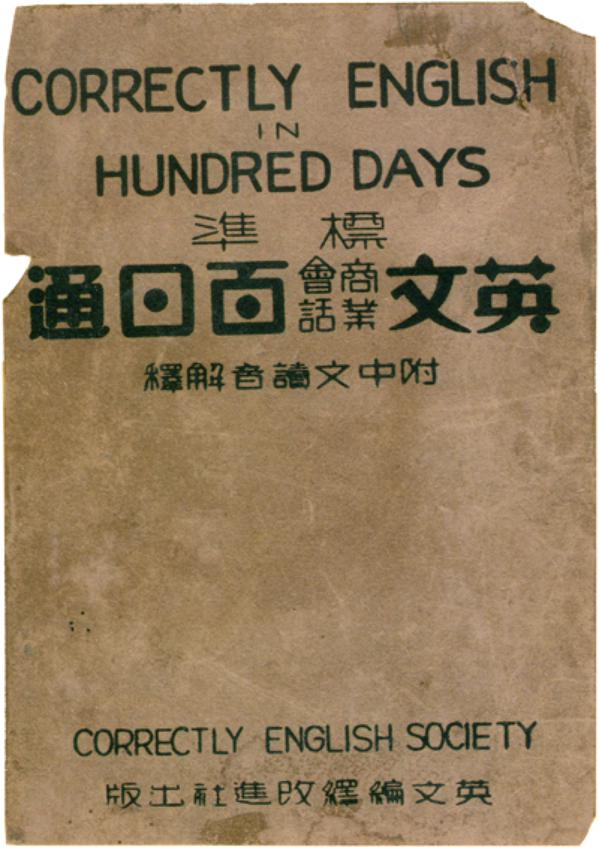Correctly English
« previous post | next post »
Ben Zimmer called my attention to this book cover, via David Adger's Twitter account:
You can read for yourself what the English says. Let's see how well it matches the Chinese:
biāozhǔn
標準
standard
Yīngwén shāngyè huìhuà bǎirì tōng
英文 商業會話 百日通
English commercial conversation; expert in a hundred days
fù Zhōngwén dúyīn jiěshì
附中文讀音解釋
with pronunciation and explanation in Chinese<
Yīngwén biānyì gǎijìn shè chūbǎn
英文編繹改進社出版
published by the society for the compilation and improvement of English
In the last line, biānyì 編繹 ("compilation") (51,100 ghits) is a little bit unusual; I automatically expected its exact homophone biānyì 編譯 ("compilation and translation") (1,500,000 ghits). But biānyì 編繹 ("compilation") will work too, since it is a synonym for biānzuǎn 編纂 ("compilation"), which is very common (982,000 ghits) in such circumstances.
biān 編 ("compile")
yì 繹 ("to unravel or unreel silk; to interpret, explain")
zuǎn 纂 ("compile")
yì 譯 ("translate")
More information on this charming volume is available here, where we learn that it:
…is prepared for the Chinese young man who wishes to served for the foreign firms. It divided nealy hundred and ninety pages. It contains full of ordinary speak and write language. This book is clearly, easily, to the Chinese young man or scholar. If it is quite understood, that will be satisfaction.
The book cover pictured above has been circulating fairly widely as a greeting card and as an image on the web for the last decade or so. Brian Lake seems to have got it started with his piece "on truly awful books that you can’t put down" (11/05/06), where he tells us that
Min Hou and Lin Yutong helped establish the ‘Correctly English Society’ at Shanghai and promised their readers Correctly English in Hundred Days in their publication of 1934.
From there it was picked up by the New York Times in "Painfully Funny" (11/08/07), and its fame gradually spread from there.
So far I have not been able to find a copy of this book anywhere. If somebody comes across one, please let me know about it. I'm eager to see what the English inside the book is like, and how they translate and explain it in Chinese. I suspect that the method employed would be similar to that in this 1902 volume that we examined in "'Spelling' English in Cantonese" (11/17/13).
[Thanks to Fangyi Cheng and Jing Wen]

Laura Morland said,
March 16, 2015 @ 12:09 am
And *I* would love to read a report written by one of the "Chinese young [men]" who ended up "served for the foreign firms."
How long, I wonder, would it take to unlearn "correctly English"?
Reinhold {Rey} Aman said,
March 16, 2015 @ 1:04 am
That book is as amusing as Pedro Carolino's
English As She Is Spoke:
[ http://en.wikipedia.org/wiki/English_As_She_Is_Spoke ]
richardelguru said,
March 16, 2015 @ 5:53 am
Being able to "Correctly English" is (I believe—I did not have much of a misspent youth) a useful skill for Pool/Billiards/snooker players.
Rodger C said,
March 16, 2015 @ 6:53 am
I first learned about this book half a century ago from a pop language book, perhaps by Mario Pei. I remember the sample sentences "I was suddenly disemployed" and "Can I have an interview with you, facial to facial?"
leoboiko said,
March 16, 2015 @ 6:53 am
Do you mean, say, how to have a proper cuppa, how to queue and so on?
Piyush said,
March 16, 2015 @ 12:37 pm
In contrast, the only useful English grammar book I have ever had was actually not written in English. The book is How to write correct English, which my father bought me when I was in middle school. The book was written in the 1950s by one R P Sinha, a civil servant in the Indian state of Bihar, and used Hindi as a metalanguage (i.e., all explanations were in Hindi; it now seems that a Bengali edition is also available).
The author, who did not describe himself as a professional linguist, appeared nonetheless to be a consummate descriptivist. On any contentious point of usage advice, he started by quoting extensively from grammar texts he considered to be classics (if I remember correctly, he seemed to have a lot of respect for Fowler) and followed that up with quotations from literature that went both for and against the opinions expressed in the quotations. He then offered an argument for his own preference, but usually also acknowledged that much of it was just based on personal preference. I still remember the pages worth of discussion he had on whether verbs agreeing with "None" ought to be conjugated as singular or plural (though unfortunately I have forgotten his conclusion).
John Rohsenow said,
March 16, 2015 @ 8:21 pm
Leave (sic) us not forget the Panda, who "eats, shoots, and leaves."!